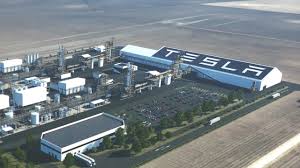Tesla Inc. broke ground on a lithium refinery in Texas on Monday. According to CEO Elon Musk, the facility should manufacture enough battery metal by 2025 to assemble around 1 million electric cars (EVs).
In order for Tesla to fulfill its lofty EV sales targets, Musk claimed the automaker must move outside its core business of manufacturing cars and into the complicated field of lithium refining and processing.
At the official ground-breaking event on Monday, Musk stated, “As we look ahead a few years, a fundamental choke point in the advancement of electric vehicles is the availability of battery-grade lithium.” Dozers and other earth-moving machinery were in use in the backdrop.
Musk stated that Tesla intended to complete the factory’s construction the following year and then achieve full production roughly a year later.
As a result, Tesla will be the first significant carmaker in North America to process its own lithium. The processing of many important minerals, including lithium, is currently dominated by China.
“Texas wishes to be able to provide for its own needs without having to rely on any hostile foreign countries. Greg Abbott, the governor of Texas, remarked at the ceremony, “We need lithium.
Musk said the automaker will continue to purchase the metal from its suppliers, which include Albemarle Corp and Livent Corp, but he did not specify how much lithium the facility would process annually. It’s not all going to be done by Tesla, according to Musk, who also stated that “we intend to use suppliers of lithium.” Construction of Albemarle’s South Carolina lithium processing facility, which will refine 100,000 tonnes of the metal annually, is expected to start next year and be completed sometime later this decade.
Musk did not specify where Tesla will obtain the spodumene concentrate, a form of raw lithium that will be processed at the facility, despite the fact that Tesla has supply agreements with Piedmont Lithium Inc. and others.
“CLEAN OPERATIONS”
Tesla announced that it will forgo the traditional lithium industry refining method, which depends on sulfuric acid and other potent chemicals, in favor of substances that were less harmful to the environment, including soda ash.
“You wouldn’t experience any negative effects if you lived directly in the heart of the refinery. So they run really clean operations,” Musk added, while local media reported that some environmentalists had voiced reservations about the plant.
Tesla has attempted to enter the lithium production market previously, as seen by Monday’s statement. In 2020, Musk informed the company’s shareholders that Tesla had acquired the rights to 10,000 acres in Nevada, where it planned to manufacture lithium from clay deposits—a feat that had never been accomplished on a large scale previously.
Tesla hasn’t yet used the procedure, despite Musk’s boasts that the business has created a unique method for producing lithium from the Nevada clay resources responsibly.
Musk has exhorted businesspeople to go into the lithium refining industry, comparing it to “minting money.”
“Please, we beseech you. We do not wish to carry it out. Last month, he asked on a conference call, “Can someone please?
The recent drop in the price of lithium and other commodities, according to Tesla, will help the company’s ailing margins in the second half of the year.
Tesla moved its corporate headquarters from California to Texas in 2021, and the refinery is the company’s most recent foray into the state. The Boring Company and SpaceX, two of Musk’s other businesses, are also active in Texas.
Tesla and Musk are “Texas’s economic juggernauts,” Abbott said, adding that “we are proud that he calls Texas home.”

















